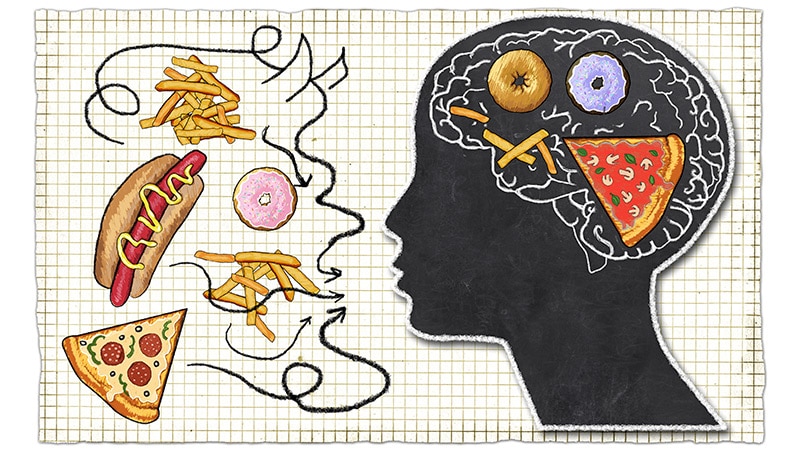
A "strong, positive association" exists between food addiction and type 2 diabetes that is only partially explained by body weight, new data suggest.
In a large Danish population-based study, people who scored positively on the Yale Food Addiction Scale 2.0 had more than a fivefold increased risk for type 2 diabetes, even after adjusting for age and body mass index (BMI). The increased risk was attenuated, but still present, among individuals with mental disorders.
The study is the first to demonstrate a positive association between food addiction and type 2 diabetes, say Christina Horsager, MD, PhD, of the department of psychiatry at Aalborg University Hospital, Denmark, and colleagues in their article published in the May issue of Clinical Nutrition.
"The findings add to our current understanding of potential risk factors for type 2 diabetes and, by extension, possible targets for interventions aimed at risk reduction," Horsager told Medscape Medical News.
It might be expected that "food addiction" would lead to overeating and weight gain, which in turn, raises the risk for type 2 diabetes. "However, the results from our study suggest that BMI is not the only mediator in this context, which is not that surprising given the complex etiology of type 2 diabetes," she said.
However, she also cautioned, "the interpretation of these findings is complicated by the fact that BMI was calculated using self-reported weight and height, making it susceptible to response bias." In addition, "the cross-sectional design of the study precludes causal interpretation of the findings."
Food Addiction, Type 2 Diabetes Strongly Linked
The study, from the Food Addiction Denmark Project, involved 1699 adults from the general population and 1394 adults from a population with clinically verified mental disorders including substance abuse, affective disorders, stress/anxiety-related disorders, and autism spectrum disorders.
Food addiction was assessed using the self-reported 11-point Yale Food Addiction Scale 2.0. The categories of mild, moderate, and severe food addiction were combined into one group, and discrete scale scores were also assessed.
Among the general population sample, 9.0% met the criteria for food addiction and 3.1% had type 2 diabetes. The odds ratio was 6.7 for the association between food addiction and type 2 diabetes, after adjustment for sex and age (P < .001), dropping just slightly to 5.6 after additional adjustment for BMI but remaining significant (P < .001).
In a dose–response model, the odds ratios per point on the addiction scale were 1.3 after age and sex adjustment (P < .001) and 1.3 with the addition of BMI adjustment (P < .001).
Association Among Those With Mental Disorders
Among those with mental disorders, 26.5% had a food addiction and 4.1% had type 2 diabetes. Here, the age- and sex-adjusted odds ratio for the association between food addiction and type 2 diabetes was 2.4 (P = .002). With BMI factored in, there was still an association, with an odds ratio of 1.8, which just missed statistical significance (P = .061).
The dose–response relationship, on the other hand, remained significant even in the group with mental disorders, with odds ratios of 1.1 (P < .001) and 1.1 (P = .034) per point on the Yale Food Addiction 2.0 scale, respectively.
An analysis of individual mental disorders showed that all associations were positive, but because of the small sample sizes, only the age- and sex-adjusted odds ratio for anxiety remained significant (4.9; P = .041).
It's likely that the weaker association among those with mental disorders is "a consequence of a ceiling effect, as food addiction "competes" with other risk factors for type 2 diabetes that are common among individuals with mental disorders, such as sedentary lifestyle and use of psychotropic medication, making food addiction a relatively weaker risk factor for type 2 diabetes in this specific population when compared with the general population," Horsager and colleagues write.
The higher prevalence of type 2 diabetes in the population with mental disorders, despite that group being nearly 10 years younger (mean age, 33.5 vs 43.4 years), lends support to that explanation, they note.
The group is continuing this work, Horsager told Medscape Medical News. "There is a paucity of studies assessing the longitudinal course and correlates of food addiction. We will aim to bridge this gap with the upcoming Food Addiction, Obesity, and Type 2 Diabetes in Denmark (FAT2DK) cohort study," she said.
The study was supported by grants from the Beckett Foundation, the A.P. Møller Foundation, the Lundbeck Foundation, and the Heinrich Kopps Grant. Horsager has reported no relevant financial relationships.
Clin Nutr. 2023;42:717-721. Full text
Miriam E. Tucker is a freelance journalist based in the Washington, DC, area. She is a regular contributor to Medscape, with other work appearing in The Washington Post, NPR's Shots blog, and Diabetes Forecast magazine. She is on Twitter: @MiriamETucker.
For more diabetes and endocrinology news, follow us on Twitter and Facebook.
Food Addiction Tied to Type 2 Diabetes, Even Beyond BMI - Medscape
Read More

No comments:
Post a Comment